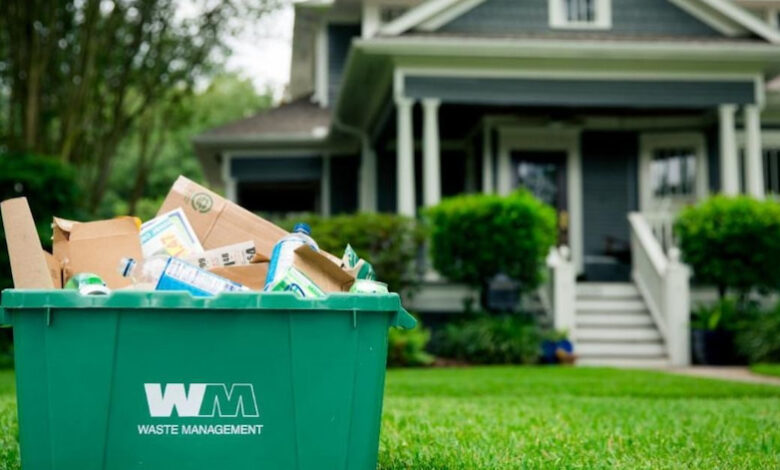What Communities Can Do for Effective Waste Solutions?

Recycling initiatives within the communities will also be part of effective waste management. Residential communities can strengthen the recycling industry by creating accessible drop-off centres for those materials, waste solutions and providing pick-up services at curbs and mounting awareness on what items could be accepted in this program and how they might do so best.
Recycling with 1 day skip hire not only helps to decrease the amount of waste that is landfilled but also preserves useful materials and lessens the environmental impact associated with brand-new products made from raw resources. In this way, the communities encourage recycling and participate in constructing a sustainable future for themselves by reducing their carbon footprint.
Implement Composting Programs:
Composting programs belong to waste solutions methods that are ecologically safe and can significantly minimize the organic waste sent to landfills. Such programs involve communities offering residents an opportunity to handle kitchen leftovers, yard waste and other organic matter through composting. Then, the composting transforms these organic materials into nutrient-enriched soil amendments that can use for gardening and landscaping.
By implementing composting initiatives, societies dispatch organic waste solutions from landfills and prevent methane emissions, the potent greenhouse gas formed during the shredding of natural materials inside these lands. Moreover, the compost obtained helps improve soil quality in local areas. Apart from contributing to the environment, composting encourages environmental consciousness amongst community dwellers.
Advocate for Reduction of Single-Use Plastics:
Communities can lobby for the decrease of single-use plastics, such as plastic bags, straws and eating utensils, to solve an escalating problem concerning plastic pollution. This advocacy could be working with local businesses or government entities to implement policies and initiatives one that promote the use of eco-friendly alternatives to discourage single-use plastic consumption.
Such measures may include supporting reusable bags, containers and utensils as well as bans or fees on single-use items. Eliminating single-use plastic don’t only reduce litter and harm nature but also saves petroleum resources as well as the energy required in manufacturing, use and disposal of plastics. By promoting these changes, communities can show the way in creating a culture of sustainability and reduction of waste.
Support Waste-to-Energy Conversion:
Waste-to-energy (WtE) conversion technologies provide a sustainable way to deal with non-recyclable waste whereby energy is generate in the process. WtE facilities that use incineration or gasification technologies to transform solid waste into electricity or heat can be supported by communities.
These facilities can offer a reliable and eco-friendly form of waste disposal, reduce the amount of garbage that ends up in landfills, as well generate renewable energy. It is crucial to mitigate emissions and environmental issues related to WtE plants, yet when properly designed and operated, they can lead towards more environmentally sustainable waste solutions practices as well as energy production, which should be beneficial for the community and nature itself.
Organize Community Clean-Up Events:
Community clean-up events are one of the keys to successful waste solutions. Residents participate in these events to help clean and beautify their neighbourhoods. Volunteers can collect litter, pick up trash and throw it away properly during such occurrences. In addition to the cleaner environment, community clean-up days foster pride and a sense of responsibility among people.
They act as a public notice of the need to manage waste and can even motivate people to be more conscious about their daily trash disposal practices. These events can be scheduled weekly, monthly, during certain seasons of the year or possibly after storms when shorelines become littered with debris and community areas are strewn with trash.
Educate and Raise Awareness:
Effective waste solutions within communities require education and awareness campaigns. It is important to educate residents about responsible waste management, recycling and composting, as well as the environmental impact of wrong disposal. These advocacy campaigns can take many forms, such as workshops, informational sessions, school programs, and online resources.
Raising awareness also includes the need to spread information regarding the advantages of waste reduction, reuse, and recycling, spotlight success stories, and explain how people participate in effective, sustainable waste management. People who are knowledgeable within the community stand a higher chance of adopting eco-friendly lifestyles and supporting waste reduction efforts.
Encourage Sustainable Practices in Businesses:
Involving local businesses in environmentally friendly waste management practices can have a positive impact on how waste is manage within a community. Supporting businesses in the reduction of single-use plastics, introducing recycling programs, and minimizing packaging waste can help reduce overall community-generated waste. Local governments, community organizations and businesses would all benefit from collaborative initiatives that promote sustainable practices.
This can be in the form of rewards to businesses that embrace responsible waste disposal practices or supporting them with resources and advice on how they could do it in an environmentally friendly way. Engaging businesses not only reduces waste but also leaves a message of commitment to sustainability that goes straight across customers and encourages other companies.

Collaborate with Local Government and Nonprofits:
In order to get effective waste solutions within a community, collaboration with local government agencies and nonprofit organizations is crucial. Local governing bodies frequently have the means and capability to initiate waste management regulations, increased infrastructure development, and recycling initiatives. Conversely, nonprofits can offer expertise, funding and collaborative opportunities for engagement.
Collaborative endeavours may involve promoting better waste collection and recycling facilities, engaging in public-private partnerships to solve waste problems, and encouraging local solutions through grants or volunteers. The key stakeholders can, therefore, act in collaboration to provide holistic waste management solutions that benefit all residents and the environment.
Also, read this: Waste-Free Living: A Guide to a More Sustainable Lifestyle




